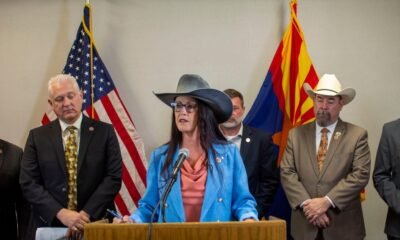arizona
Dem AGs Take a Stand: ‘It’s Destruction, Not Efficiency’ in Trump & Musk’s Federal Cuts

The attorneys general of Arizona, Minnesota, New Mexico, and Oregon gathered for a town hall in Phoenix on Wednesday, expressing their commitment to challenging extensive federal cuts initiated by President Donald Trump and Elon Musk. Arizona Attorney General Kris Mayes criticized these measures, stating, “It is not efficiency, it is destruction,” as attendees voiced their concerns about the Department of Government Efficiency (DOGE), which Musk oversees.
Under Musk’s direction, DOGE has enacted widespread layoffs and disrupted federal operations, claiming to prioritize government efficiency. Musk has stated on X, formerly Twitter, that these actions aim to prevent Democratic funding for undocumented immigrants—an assertion critics label as part of a racist conspiracy theory.
The four AGs are part of a coalition of 23 Democratic attorneys general who have launched several lawsuits against the Trump administration. Mayes announced plans to file an eighth lawsuit this week, addressing cuts that have impacted veterans and their families. The AGs are also preparing a Freedom of Information Act request to gather data on those affected by DOGE.
Wednesday’s meeting marked the first of several town halls planned across the country, with the next scheduled for March 20 in Minnesota. Oregon Attorney General Dan Rayfield emphasized the importance of listening to the community’s concerns during these events.
Federal layoffs have caused chaos, with many employees learning of their terminations through impersonal emails. For instance, nearly 6,000 U.S. Department of Agriculture (USDA) employees were recently rehired following a ruling declaring their firings illegal. Testimonies from attendees highlighted the disruption, as organizations reliant on federal funding face uncertain futures.
Elyse Guidas, executive director of Activate Food Arizona, shared the repercussions these cuts could have on affordable food access in rural communities. Adrienne Udarbe from Pinnacle Prevention echoed these concerns, noting that the impact would manifest in rising food costs as USDA funding delays continue.
Mayes noted that legal action had compelled the USDA to release funds meant to support low-income programs, emphasizing the ongoing fight for fair treatment. “While the president may be powerful,” Rayfield stated, “he does not have the ability to reverse prior approval decisions.”
The AGs underscored the human cost of these layoffs. New Mexico Attorney General Raúl Torrez criticized Musk’s and Trump’s rhetoric regarding federal employees, asserting that the focus should remain on the people behind the positions, regardless of their political affiliations.
Several laid-off federal workers recounted their experiences during the town hall. They described their abrupt terminations, often unaware of the decisions being made in Washington, D.C. Issues within the Department of Veterans Affairs also arose, including anticipated layoffs affecting 83,000 employees, raising concerns about critical services like music therapy.
Despite the prevailing sense of fear among attendees, the AGs aimed to instill hope. “This was an incredibly powerful town hall,” Mayes remarked, indicating plans for ongoing litigation concerning federal worker firings. Minnesota AG Keith Ellison reached out to those affected: “You’re not alone,” he stated, asserting that change would require both legal action and public support.


















